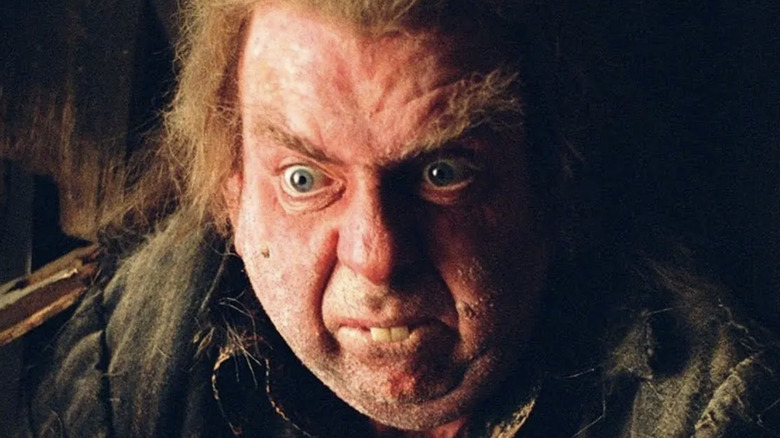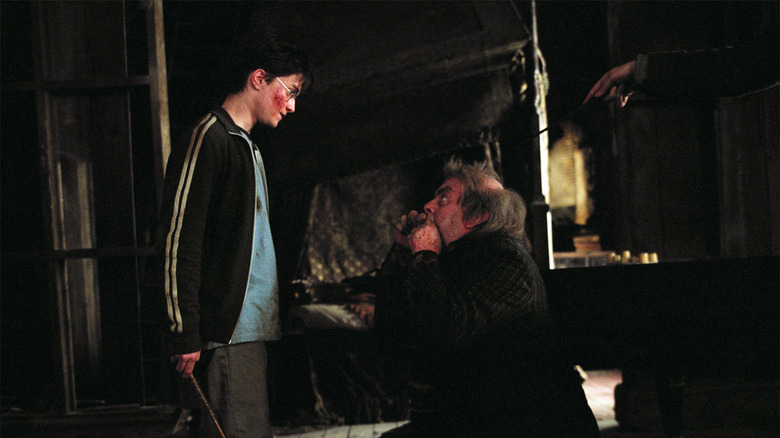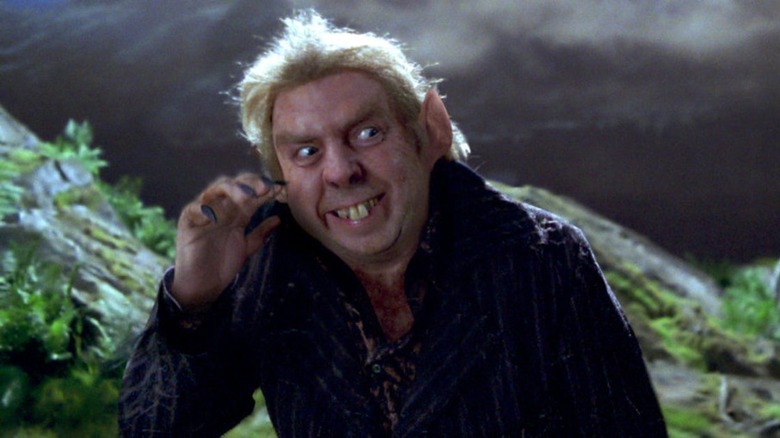Timothy Spall Of The Last Bus Compares Peter Pettigrew's Harry Potter Ending In The Books And Movies - Exclusive
Peter Pettigrew's demise takes the cauldron cake for complicated, mildly ridiculous, albeit symbolic literature deaths. His "Harry Potter" book death is something of a pseudo redemption arc — because he owed Harry his life, after all. His sacrifice on Harry's behalf wasn't exactly a choice given that life debts have a magical component to them in the Potter universe. To add an extra layer to this magical red tape, the sentient hand that Voldemort gifted Pettigrew with black magic isn't keen on Pettigrew saving The Boy Who Lived — choice or no choice. Caring is a weakness in Voldy's eyes, as the magical dictator is void of all empathy and morals.
Peter strangles himself to death against his will to save the son of the best friends he all but killed himself, which is a poetic way to go for everyone's favorite rat. The movie, however, took a more comedic approach that bordered on "The Three Stooges" levels of slapstick comedy. Peter dies via an errant spell cast by Dobby that he meets with an "Ow" before toppling over. If they need a Fourth Stooge, Peter is their guy.
During an exclusive interview with Looper for his new film "The Last Bus," Peter Pettigrew actor Timothy Spall gave his thoughts about Peter's movie ending and the nuances between both the book and film versions.
What makes someone evil?
On if he wished he could have explored the book's more nuanced ending for Peter, or if he likes Peter's comedic death in the film, Spall said, "Well, funny you should say that because there [was] a big debate about whether the hand strangling itself was going to be pretty close to 'Monty Python.' Do you know what I mean?" He noted how goofy the book's ending could play out onscreen, adding, "Or something out of a... Where you read it narratively, and you have all that poetic underpainting that you are talking about there, [it's] very difficult to show that, somebody with a rogue hand [killing themselves without looking like] Inspector Clouseau."
When it comes to evil characters in the "Harry Potter" universe, Peter doesn't necessarily fall into that unambiguous category. "One of the things I always liked about Peter Pettigrew is that he is reprehensible, and he is a weak, cowardly, devious character, but there's also a little [bit] of possible redemption about him. Anybody who is driven to do things through weakness is not doing it through pure evil — they're doing it through self-survival," he said. "I think he is very much from that area, bullied and called the fat kid and the "so [and so]" kid and a lump of a boy. [He's] always the butt of the jokes of the rest of them and ultimately ends up being one of the most powerful, albeit via his nefarious deeds." In a way, Peter is powerful. He survives far longer than most of his former friends, after all.
Poetry meets absurdity
Spall noted the ridiculous nature of Pettigrew's symbolic death, saying, "His comeuppance is poetic, but it's also one that's [comically] tragic ... I always had the image of Fritz Lang's 'M' with Peter Lorre, the mass murder, when [for] such an evil character, you cannot help but feel pity for him, his ultimate demise."
One thing's certain: Peter could have used a good therapist rather than teaming up with an evil wizard dictator. "Evil [people] are often people who are weak or driven by something that's really some injustice, some indignity in them that creates this action ... It ultimately is a very, very unpleasant way of self-survival, and you choose to use the evil route to survive rather than be kind and get smashed," Spall proposed. "It's a lesson for life, really, and understanding and ultimate compassion. Maybe we can eradicate it through understanding it."
"The Last Bus" is now available to rent on digital platforms.


